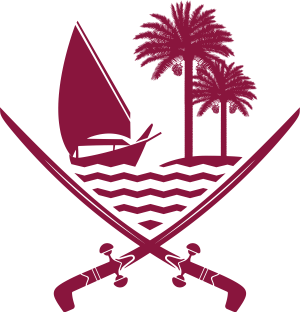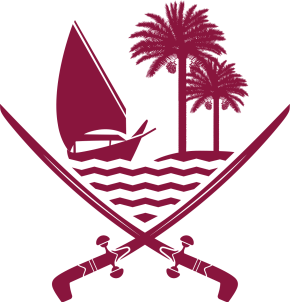State of Qatar: Difference between revisions
No edit summary |
No edit summary |
||
| (3 intermediate revisions by 2 users not shown) | |||
| Line 1: | Line 1: | ||
[[Category: | [[Category: Countries]]{{NationTemplate | ||
|color=#404040 | |color=#404040 | ||
|title1=State of Qatar | |title1=State of Qatar | ||
| Line 11: | Line 11: | ||
|largest_city=City of Doha | |largest_city=City of Doha | ||
|oldest_city=City of Al Zubarah | |oldest_city=City of Al Zubarah | ||
|national_anthem=[[File: | |national_anthem=[[File:QatarAnthem.mp3]] | ||
|region=Middle East | |region=Middle East | ||
|political_system=Absolute monarchy | |political_system=Absolute monarchy | ||
| Line 24: | Line 24: | ||
|constitution=Qatari 2003 Constitution | |constitution=Qatari 2003 Constitution | ||
|discord=[https://discord.gg/sbBrgyFPNe Qatar Community Discord] | |discord=[https://discord.gg/sbBrgyFPNe Qatar Community Discord] | ||
}} | }}== History of Qatar == | ||
== History of Qatar == | |||
Qatar, officially known as the State of Qatar, is a sovereign country located in Western Asia, occupying the small Qatar Peninsula on the northeastern coast of the Arabian Peninsula. Here is a brief history of Qatar: | Qatar, officially known as the State of Qatar, is a sovereign country located in Western Asia, occupying the small Qatar Peninsula on the northeastern coast of the Arabian Peninsula. Here is a brief history of Qatar: | ||
=== Ancient History: === | === Ancient History: === | ||
| Line 44: | Line 43: | ||
== Royal House of Al Thani == | == Royal House of Al Thani == | ||
The al-Thani family, a member of the Tamimi tribe, is the ruling family of Qatar. | |||
==== The Royal Family Members are: ==== | |||
- H.H. Sheikh Khalid bin Hamad Al Thani: '''Emir''' | |||
- H.H. Suleiman Bin Hamad Al Thani: '''Prime Minister''' | |||
- H.E. Aaliyah bint Hamad Al Thani: '''Minister of Education''' | |||
- H.E. Abdalaziz bin Hamad Al Thani: '''Minister of Defense''' | |||
- H.E. Fahad bin Hamad Al Thani: '''Minister of Interior''' | |||
- H.H. Ahmad bin Khalifa Al Thani: '''Chairman for QatarEnergy''' | |||
- H.H. Ali bin Khalid Al Thani: '''Chairman of Advisory Council of Qatar''' | |||
== Emblem & Flag of Qatar == | == Emblem & Flag of Qatar == | ||
[[File:Flag of Qatar.png|left|thumb|Flag of Qatar]] | [[File:Flag of Qatar.png|left|thumb|Flag of Qatar]] | ||
[[File:1200px-Emblem of Qatar 282022E28093present29.png|left|thumb|Emblem of Qatar]] | [[File:1200px-Emblem of Qatar 282022E28093present29.png|left|thumb|Emblem of Qatar]] | ||
[[Category: Countries]] | |||
[[Category: Countries in Asia]] | |||
Latest revision as of 14:00, 12 April 2024
| ||||||||||||||||||||||||||||||||||||||||||||
History of Qatar
Qatar, officially known as the State of Qatar, is a sovereign country located in Western Asia, occupying the small Qatar Peninsula on the northeastern coast of the Arabian Peninsula. Here is a brief history of Qatar:
Ancient History:
Qatar has a long history that dates back to ancient times. The area that is now Qatar was inhabited by various nomadic tribes, including the Bedouin, for thousands of years. The region was influenced by different empires and civilizations, including the Sumerians, Babylonians, Persians, and Greeks.
Islamic Period:
In the 7th century, Islam spread to the Arabian Peninsula, and Qatar embraced the religion. It became part of the Islamic Caliphate and experienced Arab-Muslim rule for several centuries. During this time, the economy of Qatar relied on fishing, pearling, and trade. Ottoman and British Influence: In the 16th century, Qatar came under the control of the Ottoman Empire. The Ottomans ruled the region until the early 20th century when Qatar became a British protectorate in 1916. The British influence was mainly aimed at protecting maritime trade routes and countering the expansionist policies of other regional powers.
Discovery of Oil:
The discovery of oil in the 1930s transformed Qatar's economy and brought significant changes to the country. Qatar's oil reserves, particularly the vast offshore North Field, are among the largest in the world. The revenue generated from oil exports allowed Qatar to modernize its infrastructure and improve the standard of living for its population. Independence and Modernization: Qatar gained independence from Britain on September 3, 1971. Sheikh Khalifa bin Hamad Al Thani became the country's ruler and was later succeeded by his son, Sheikh Hamad bin Khalifa Al Thani, in 1995. Under Sheikh Hamad's leadership, Qatar pursued an ambitious modernization program, investing in various sectors such as education, healthcare, and infrastructure.
Diplomatic Crisis:
In 2017, Qatar faced a diplomatic crisis when several Arab countries, including Saudi Arabia, the United Arab Emirates, Bahrain, and Egypt, imposed a blockade on the country. The blockade was motivated by political disagreements and accusations of supporting terrorism, among other issues. Despite the challenges, Qatar managed to overcome the blockade through diversification of its economy and strengthening diplomatic relations with other countries.
Qatar Today:
Today, Qatar is known for its high-income economy, fueled by natural gas and oil exports. It has one of the highest per capita incomes in the world. The country has also focused on becoming a global hub for sports, education, and culture. Qatar continues to play an active role in regional and international affairs, hosting various diplomatic events and supporting initiatives for peace and development.
Royal House of Al Thani
The al-Thani family, a member of the Tamimi tribe, is the ruling family of Qatar.
The Royal Family Members are:
- H.H. Sheikh Khalid bin Hamad Al Thani: Emir
- H.H. Suleiman Bin Hamad Al Thani: Prime Minister
- H.E. Aaliyah bint Hamad Al Thani: Minister of Education
- H.E. Abdalaziz bin Hamad Al Thani: Minister of Defense
- H.E. Fahad bin Hamad Al Thani: Minister of Interior
- H.H. Ahmad bin Khalifa Al Thani: Chairman for QatarEnergy
- H.H. Ali bin Khalid Al Thani: Chairman of Advisory Council of Qatar
Emblem & Flag of Qatar



